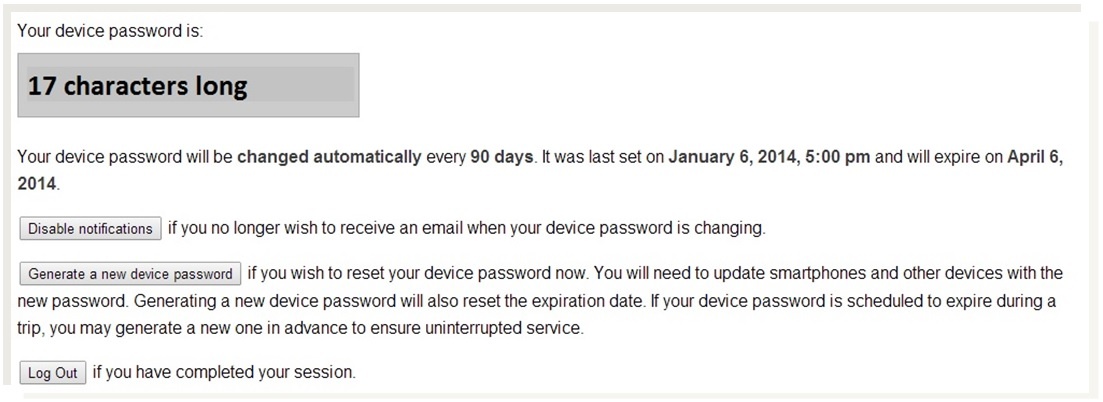...
A device password is a password designed for apps and devices that are not set up to use two-factor authentication systems, such as Duo Security. Your device password is automatically managed by the system and will be changed for you every 90 days.
...
| Info |
|---|
Pleasebe aware of a recent update to the Gmail app on newer versions of Android and iOS devices, allowing the apps to support two-factor authentication like we have with Duo Security. If you are directed to a uLogin page, you should enter your regular Drew password and approve a Duo login. Users with these new versions of the Gmail app/mobile device operating systems will not need to use their device password. They will still be prompted to log in again every 90 days with the changing of their device password by the system. Please note that this update does not yet affect third-party email programs (such as Thunderbird, Apple Mail, or Microsoft Outlook). |
...
| You can choose to log in using the various devices assigned to you, which are listed in the drop down. If you only have one device set up on your account, that is the device you will need to use to log in. For devices like your smartphone, you can select Duo Push, a phone call, or a passcode. |
| We recommend selecting Enable Notifications so that you will receive an email automatically when your device password is about to expire.* You will also get an email when the password has been changed automatically. In the image to the left, this selection was already made, so the button reads Disable Notifications.
*If you no longer need the device password, you can leave this turned on so that you know when you will be prompted to log in with your normal password again, or you can disable notifications. |
What happens when my device password expires?
...
| Warning |
|---|
This is for your average Android device, and does not cover the large range of Android devices. For further help contact the UT Service Center at x4357973-408-4357. |
| Expand | ||
|---|---|---|
| ||
When your device password changes, your phone will display an error message when it tries to retrieve your email. You will see either a notification like this at the top of your screen: Or within the Gmail app like this: Either tap the notification or click Sign-In. ** NOTE ** Newer versions of the Gmail app will direct you to a uLogin page. Log in here with your regular username and password - NOT your device password. ** If you are directed to a screen that does not look like the uLogin screen, you should enter the device password. To get your new device password, proceed to the self-service site (drew.edu/duo). For security reasons, you will be prompted to perform two-factor authentication again even if you have already logged into uLogin. Information about your device password is displayed towards the bottom of the page, you can then input the new device password into the error message window on your Apple mobile device. We recommend selecting Enable Notifications so that you will receive an email automatically when your device password is about to expire and when it has been changed automatically (in the image above, this selection was already made, so the box reads Disable Notifications). |
...
If you experience further issues changing your Device Password please contact the UT Service Center at x4357 973-408-4357 (or xHELP). You can also come to either the UT Helpdesk or ITC located in the Academic Commons of the Library for in person support.





